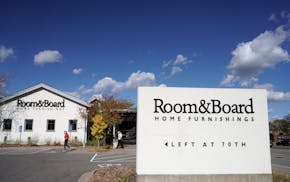Racial minorities in the Twin Cities are far more likely than whites to be denied a mortgage, regardless of their credit scores, the location of the home and other key factors, new research from the Federal Reserve Bank of Minneapolis shows.
The denial rate for Asian applicants in the region was 3.2%, for Latino applicants 3.3% and for Black applicants 4.3%. The denial rate for white applicants was 1.7% in the three-year period studied by the Fed.
"We have one of the largest homeownership gaps in the country, and it's something that hasn't changed much over time," said Alene Tchourumoff, the Fed's senior vice president of community development and engagement, in an interview.
"We were wondering: What are some of the characteristics that might explain the variations in homeownership?" she added.
The Fed used more detailed information, including the applicant's credit score, that was not available or incorporated into previous analyses of mortgage denials, to get a better understanding of why people of color are less likely or less able to buy a home. Homeownership, for many people, is critical for building long-term wealth.
Tchourumoff said many previous studies were not able to adjust for factors such as credit scores in the mortgage application process, leaving those studies open to criticism that they failed to reflect the most critical considerations in the underwriting process.
This analysis was based on federal Home Mortgage Disclosure Act mortgage data for nearly 100,000 borrowers in the seven-county Twin Cities metro area. It focused on those who applied for a 30-year conventional mortgage, which tend to be the lowest-risk mortgages, from 2018 through 2020.
The research — done by Ben Horowitz, Kim Eng Ky and Katie Lim — controlled for the location of the property, the loan-to-value ratio of the mortgage and the debt-to-income ratios of the borrower.
"This was really about trying to find apples-to-apples comparisons," said Ryan Nunn, assistant vice president for community development and engagement. "We were able to see that it's not about place and neighborhood. It's about people and how they look on paper."
The study covers 56% of the mortgage applications for owner-occupied homes in the Twin Cities area over that three-year period. About 20% of those applications were for homes in Minneapolis and St. Paul, with the rest in surrounding suburbs.
The researchers noted that some of the variations in the denial rates might be explained by differences in various factors, including wealth. Black household income, for example, is less than half the median income for white households. Other differences that could not be observed, like employment, are also important, they said.
While the Fed report painted a comprehensive picture of the differences in denial rates between racial and ethnic groups, it didn't fully explain why the gaps exist. That's an issue that's been perplexing to the mortgage industry itself.
"Yes, that systemic gap remains in our industry," said Keenan Raverty, vice president of Bell Bank Mortgage. "We, along with other mortgage firms in Minnesota, and across the country, need to help people overcome the obstacles to homeownership."
Public and private partnerships aimed at helping narrow the denial rate gap and increasing minority homeownership have been underway for decades, Raverty said. They were derailed slightly during the 2008-09 recession, when the industry shifted its focus to helping existing homeowners avoid foreclosure.
The focus has now shifted back to closing the gap in ownership, said Raverty, who is on the leadership team for the Homeownership Opportunity Alliance, a coalition of organizations, businesses and individuals who are working to increase minority ownership in Minnesota.
The percentage of U.S. residents owning their homes increased to 65.5% in 2020 — a record 1.3% increase from the previous year — while the rate for Blacks was 43.4%, slightly lower than it was a decade earlier, according to a recent report from the National Association of Realtors.
Bell Bank Mortgage, the largest retail mortgage lender in Minnesota, recently hired Kasey Kier to be the company's national community development manager. After 27 years at the Minnesota Housing Finance Agency, most recently as assistant commissioner, Kier is charged with helping the company address some of these industrywide issues and be part of solutions in the communities Bell serves.
Closing the racial homeownership gap, Kier said, is going to require public and private partnerships. The McKnight Foundation recently announced the GroundBreak Coalition, which aims to create a $2 billion fund to address inequalities in the region.
Lenders also have to help eliminate myths that have led minority members to think it isn't possible to own their own home, Kier said.
"People don't realize that they don't need to do it alone," she said. "We need to better engage with communities and develop the right partnerships and right programs. Things are not going to change if we are not intentional about changing things."

Room & Board transfers ownership to employees with stock plan
Stock market today: Wall Street falls sharply after dispiriting data on the economy, as Meta sinks
Congo questions Apple over knowledge of conflict minerals in its supply chain
Amazon cloud computing unit plans to invest $11 billion to build data center in northern Indiana

